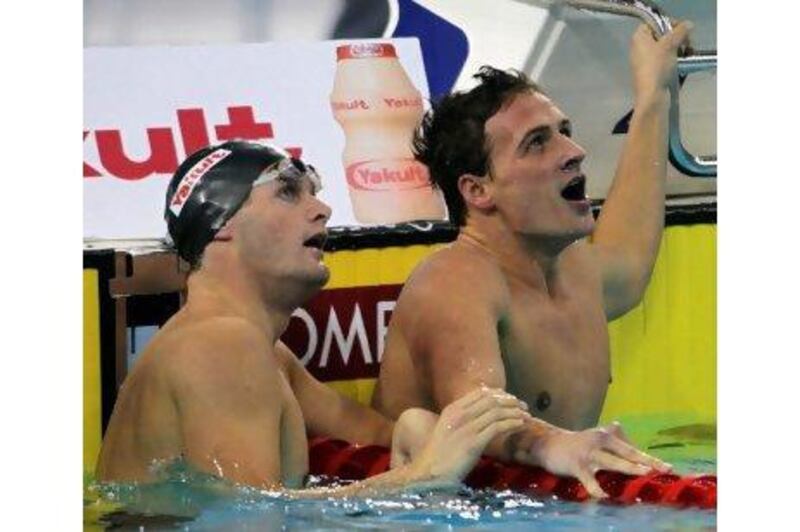Ryan Lochte came into the world less than a year before Michael Phelps. At last, he's making his own splash
A late American racehorse named Sham might have epitomised the curious sporting condition of birth-certificate burden.
Foaled on April 9, 1970, Sham joined the world with no idea that a mighty being called Secretariat had come 10 days earlier and that ultimately, Secretariat would define Sham's life so that you could not mention Sham without mentioning Secretariat.
That would fall into sport's bulging cruelty file, because in the 1973 Kentucky Derby, Sham ripped out two teeth at the starting gate, bled along the way yet still ran either the second-, third- or fourth-fastest time recorded in the entire 136 years of the extravaganza.
Nobody knows that time precisely, because they did not clock runners-up, because in a race limited to three-year-olds, Sham's blazing time still had not caught Secretariat, and Sham never did win another race.
The hard possibility of such cold reality fattens the appeal of the world record that happened last night out in the raved-about swimming structure in the sand, where in a sense, a swimmer with a birth-certificate burden of his own kept finding his way out of long, tall, dark-haired American eclipse.
Ryan Lochte, the American with the gorgeous strokes whose birthdate in 1984 preceded by 10 months the peerlessly decorated Michael Phelps when 10 years would have been more opportune, continued bolting toward being a big hoo-ha come the London 2012 Olympics.
At the 10th Fina World Short-Course Swimming Championships in Hamdan bin Mohammed bin Rashid Sports Complex, he recorded the first individual world record since the honchos banned the funky swimsuits that made world records so blase in 2009.
In arguably the most arduous discipline in the sport, the 400-metre individual medley, the four-stroke event that makes you look at single-stroke events and wonder why those guys cannot demonstrate more versatility, Lochte went in a celestial 3mins 55.50secs.
And, as a bonus, his gathering momentum pleases even his victims.
"I think if you had to take all the top swimmers in the world over the last two or three years, and kind of weigh who deserves the perseverance award, I think he deserves it as far as Americans go," said Scott Clary, the fellow American who won the bronze medal.
In continuing a thoughtful dissertation, Clary emphasised "he swam against Michael head-to-head" for eons, and said, "I know the guy works his butt off," and added, "I'm proud of him."
"A unique athlete," the equally supportive silver medalist Oussama Mellouli said of Lochte.
"Pretty laid-back. Even in a moment like this when people expect a lot from him, he just keeps his cool. "Going up against Phelps so long and now he's making a breakthrough. It's good to see that."
Then, he added the line that does not always come true: "Athletes that work hard get to have payoff days."
As ballyhooed in chlorine circles, Lochte finally bested Phelps head-to-head in a major competition last August in the US Nationals in California.
His swimming-coach father told the News-Journal in Daytona Beach, Florida: "Mentally it's just another step, but it's a big step."
Phelps had won 38 consecutive races in championship events in the long-course 200-metre individual medley, and he had won 17 straight in pools that also contained Lochte.
Lochte wrapped two additional gold medals and two silvers around that victory, and kept pushing his arc upward through his 20s in a fine second act to follow a first hardly shabby one.
At Beijing 2008, his three gold medals included his first individual medal when he won the 200-metre backstroke despite not tying his suit tightly enough and having water flood in, all of which lurked in semi-anonymity beneath Phelps' eight-gold umbra.
Now the au courant theme goes that while Phelps has abandoned some of his noted fastidiousness in the details that wind up mattering in a game of split seconds, Lochte has abandoned some of his noted dietary carelessness.
So as they lined up around quarter past seven last evening for the 400m individual medley, another world record would come even though Lochte felt strangely off through the butterfly and backstroke portions of the programme, before "all of a sudden," he said, finding "an extra gear" and feeling "like my normal self".
In an arena half-empty, the biggest cheers came from Tunisian fans pulling for Oussama Mellouli and cheering his silver medal, but the intriguing recent history of the sport still ran across another crescendo, making a nice thought that a guy born in the same era as the king can struggle and strain and find his way to his own protracted moment.
It's just a rough life that it can't always work that way for everyone, including horses.





